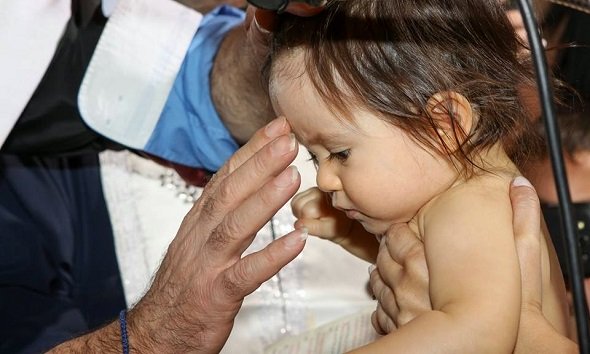Infant Baptism: Orthodox Answers to Protestant Claims
8 February 2020Although Professor Georgopoulos refers specifically to Greek Protestants, the latter belong to world-wide Protestant denominations and so the article is of general interest.
On what grounds do the [Greek] Protestants reject infant baptism? They themselves claim that the sole criterion is Holy Scripture [Sola Scriptura] and that there is no scriptural basis for it.
1) Protestant contradictions.
The position of some Protestants that infant baptism lacks scriptural basis brings them into direct conflict with the founders of Protestantism. At the time of the Reformation, rejection of infant baptism was a position held passionately by the Anabaptists, the most radical wing of the movement. They and their position were firmly opposed by the founders of Protestantism, who also had Sola Scriptura as their criterion.
In two of his basic texts, of particular weight, The Smalcald Articles (Part III, art. V) [1] and the Large Catechism (Part IV) [2], Martin Luther is very clear: a) infant baptism is in accordance with Holy Writ; b) it is necessary; and c) it is pleasing to God.

In his classic work Institutio Christianae Religionis (IV, 16, 1-32), John Calvin demolishes one by one the scriptural and logical arguments of the Anabaptists. Indeed, Calvin considered the defence of infant baptism a mark of purity of the Christian faith as opposed to the distortions of the Anabaptists.
Zwingli aligned himself with Calvin on the issue and expressed his views in his work Von der Taufe, von der Wiedertaufe und von der Kindertaufe, published in 1525. In three public disputations in the same year, he attempted- but failed- to convert leading members of the Anabaptists.
Bearing in mind, then, the positions of the founders of Protestantism and those of some other Protestants, we are faced with a great contradiction: both sides invoke Holy Scripture and argue against each other as to the meaning of the same texts on the same subject.
This contradiction is even more serious than mere disagreement, because, according to those Protestants who oppose infant baptism, the founders of Protestantism, i.e. their spiritual forefathers, defended human fabrications and anti-Biblical views as being the will of God!
For Orthodox Christians, the Protestant contradictions on the issue of infant baptism are indicative of the permanent, perplexing tragedy of Protestantism.
2) The scriptural passage Mark 16, 16.
This is the verse which some Protestants claim is the principle argument against infant baptism. They present as an invincible argument the wording of the verse: ‘those who have believed and been baptized will be saved’. In vain. The verse is to be understood within its theological context and expresses with precision the requirements for an adult to become a Christian in a hostile environment such as that which obtained when the Gospel was first being preached and also for many centuries thereafter, during the persecutions. These requirements still apply today in the field of missionary work or, indeed, in the case of a non-believer or atheist who wishes to become Christian. By what logic is the fundamental requirement for an adult to enter the Church an essential for the child of a Christian family?
For the Orthodox faith, the sacrament of holy baptism removes the legacy of corruption and death, and not by magic means. The infant bears no personal responsibility which would require repentance, as is the case of adults. So there is no sense in which the above verse constitutes scriptural testimony against infant baptism.
- Scriptural testimony in favor of infant baptism.
The Protestant claim that infant baptism lacks support in the Holy Scriptures is far from true, because
- i) it undervalues Christ’s particular interest in children (Matth. 19, 13-15).
- ii) it ignores the fact that baptism has replaced circumcision on the eighth day after birth, which was a prefiguration of baptism. (Col. 2, 11).
iii) it overlooks the fact that Christ placed no age restrictions on entry into the kingdom of heaven (Jn. 3,5).
- iv) it fails to mention that the Apostles baptized families, in which, naturally, there would have been children (Acts 16, 14-15; I Cor. 1, 16).
- v) it would have to prove that the three thousand people who believed and were baptized after the sermon of Saint Peter (Acts 2, 39-42) allowed their children to remain unbaptized.
Our final observation which demonstrates that there are no historical or theological grounds for the Protestant charges against infant baptism comes from Saint Nektarios: ‘Nowhere in Holy Scripture does it appear that Christ ordered the exclusion of infants from baptism, or that the holy Apostles, in the course of their mission, refrained from baptizing the infants of gentiles who came to them and were baptized into the faith’ [3].






